Best Natural Weed Killer: Salt, Vinegar or Hot Water? I Tested It.
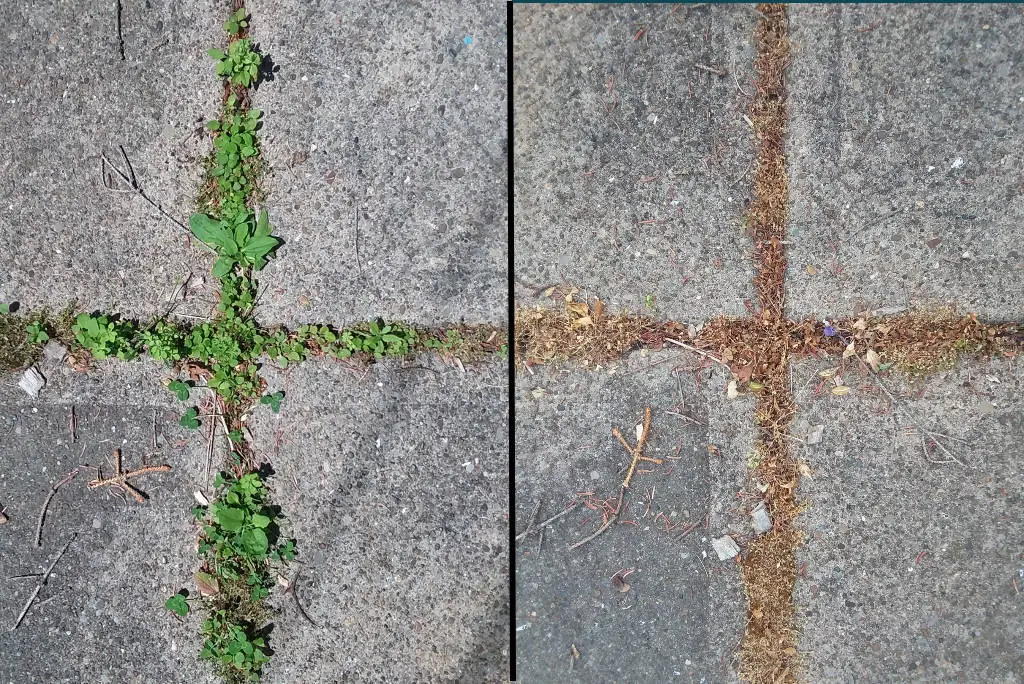
Best Natural Weed Killer: Salt, Vinegar or Hot Water? I Tested It.

For years, I have been using a tried and true non-toxic technique to get a weed-free patio using nothing but vinegar. I do go through quite a few jugs of vinegar though, since we have two small patios and lots of driveway and sidewalk cracks that get weedy every year. I have seen other non-toxic suggestions for killing weeds naturally, so I decided to do a little experiment to see whether any of these methods comes out clearly on top as the best natural weed killer.
Testing Non-Toxic Weed Killers
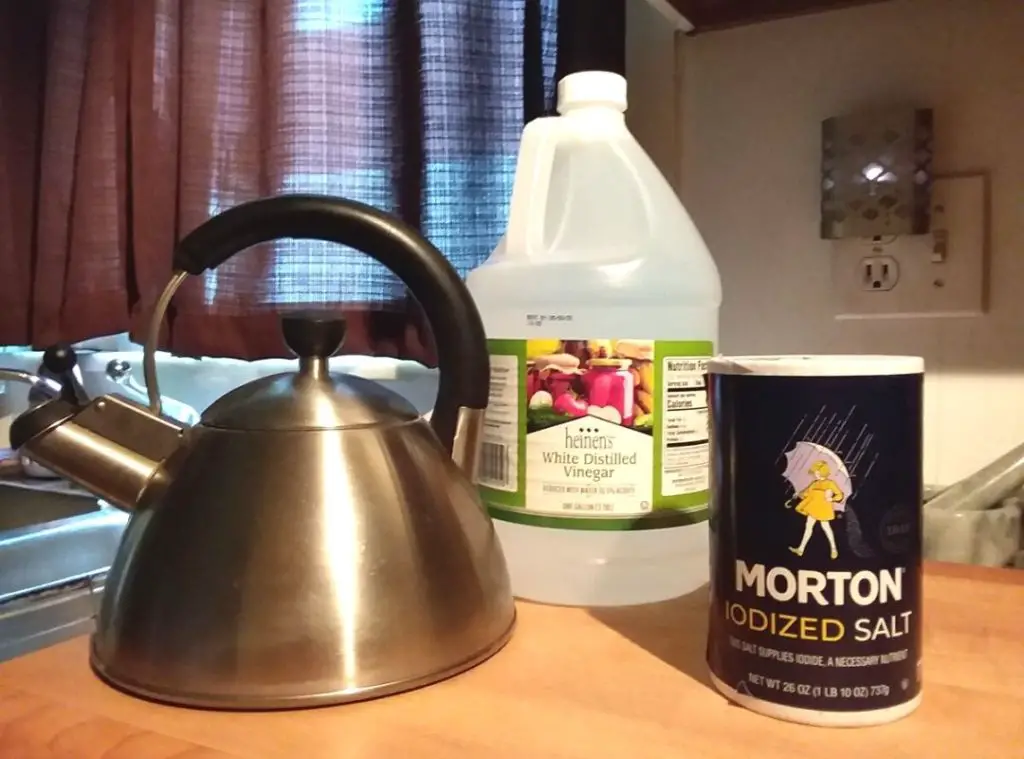
I decided to test the most popular suggestions for killing weeds with natural, non-toxic methods. Those methods include: boiling hot water, salt water and/or vinegar. You can also do a combination of these. Many recipes also suggest adding some Dawn dish soap to your homemade weed killer, but I didn’t see anyone suggesting dish soap as an effective weed killer by itself, so I didn’t include it in this test. It could probably be added to any of these recipes to make them even more effective.
I picked some weedy areas of my driveway, and marked four sections with masking tape labels. Here are the weed killing concoctions I applied to each section:
- Plain white household cooking vinegar (5% acetic acid)
- Salt water (3 cups water, 1 cup Morton’s table salt)
- Salt/vinegar mix (1 1/2 cups vinegar, 1/2 cup salt)
- Boiling hot water
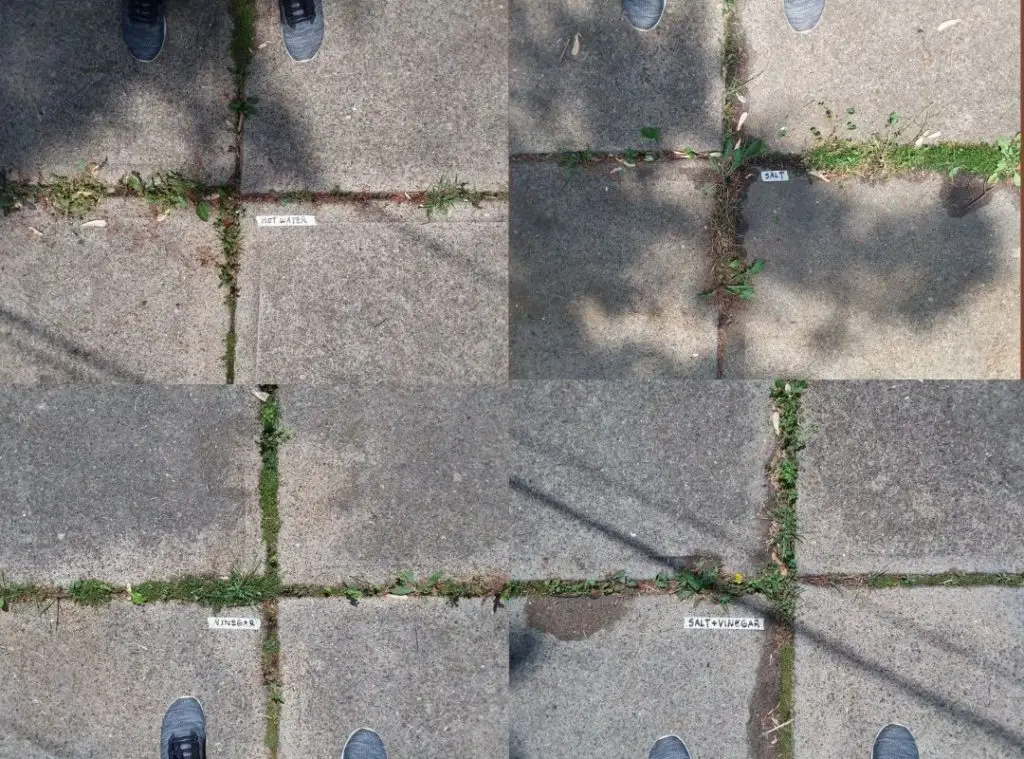
For the salt water mixture I read suggestions that I might need use even more salt than this for a good salt to water ratio, so I originally tried to do 2 cups of water to one cup of salt, but the salt was not dissolving well, so I added another cup of water and even heated it a bit to try to get the salt to dissolve. I was still left with a bunch of undissolved salt in the bottom of the mixture. The salt/vinegar mix had similar issues.
In doing this I also realized that if this ratio is correct, I would require a very a large amount of salt to take care of all the areas I need to treat, so it seems a little impractical and I worry about the potential long-term soil damage from using that much salt, even in areas not directly touching my garden.
Results of the Weed Killer Test
First off, let me just say that I realize that this is not a terribly scientific experiment. I can’t ensure that there were the same types of weeds in each section that I picked. Certain natural herbicides might work or worse better on different types of weeds. And only testing one small section for each weed killer isn’t going to be definitive. That being said, let’s see what happened.
Here are the driveway cracks four days after the various treatments:
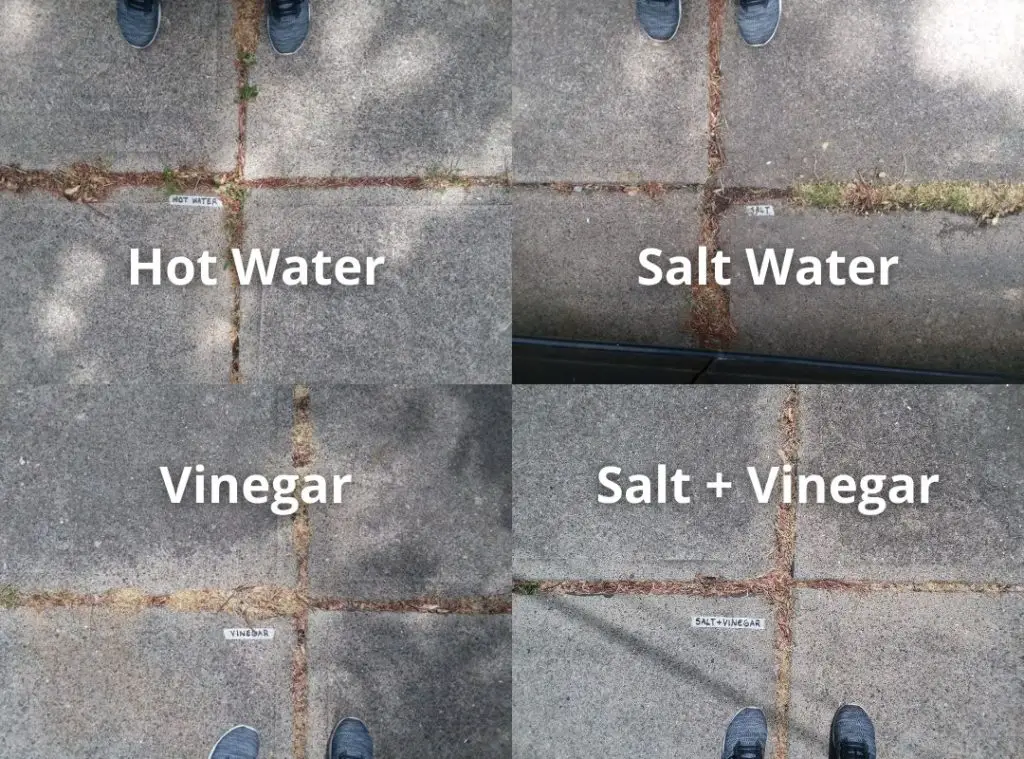
At first glance, they all appear to have worked, but the sections where I used vinegar (the two bottom pictures) seem to be the most “dead.” I still see some green weeds in the sections where I used boiling hot water and salt water.
Update 6/25/2021:
I checked back on all these sections a month later, and I can’t really say that there is any clear winner. All the sections are still mostly dead, with a weed popping back up here or there. Honestly, the hot water seemed to work about as well as anything else, it’s just time-consuming to wait around for the water to boil, pour it on a section of sidewalk cracks, go back into the house, fill the teapot again, and wait for it to come to a boil.
But hot water is certainly a cheap option with no plastic jugs to dispose of. Plus, if you are in an area that harbors amphibians like frogs or salamanders, it’s possible the vinegar or salt may hurt them, so boiling water might be a better option if you are worried about frogs coming in contact with the treated areas.
For more eco-friendly gardening tips, visit Yard & Garden.


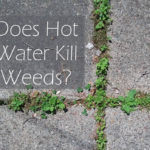
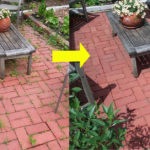
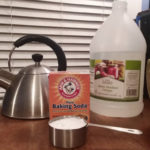
Thanks for the information. The gentleman who mows my lawn gripes about me not using any weed killers for the dandelions & whatnot. I will be trying the vinegar method on my driveway & patio.
Wow. It’s not his lawn, what does he care if you have some weeds? We have a lot of dandelions and other weeds in our lawn as well because we don’t use herbicides. I especially don’t want that stuff near our garden where we grow food. Unfortunately our neighbors do use the stuff. I like to have a weed-free patio though, and vinegar works well.
Thanks for doing this! I have a weedy patio in a garden full of birds and a dog (who sometimes eats vegetation) so I don’t want to use toxic chemicals. I am also a scientist so loved your scientific approach, and even your inclusion of caveats! I will try the boiling water since our patio is small and if the boiling takes too long I’ll give the vinegar a shot!
Thanks! I hope it works out for you!
Tell your lawn mower person that humanity requires bees and other pollinators to have fruit and vegetables (and protein, too, since much of our protein comes from animals that eat plants). Dandelions are one of the earliest flowers and rally is very important to bees and other pollinators.
I have tried boiling water, vinegar and a device that blows super heated air on new weed growth in the spring, but none of it worked . To be fair, non Roundup weed killers have not killed the newest invasive grass-like weed. It would kill the visible growth, but not touch the roots. I would have more of the stuff the next day! I may try boiling vinegar and salt on my worst driveway cracks, though. Even if I have to repeat it fairly often, it would help!